Forced Tolerance
How Israeli tourists are reshaping a Sri Lankan surf town.
In the early hours of the evening, Masi stands outside his shop chatting with a friend. They’re posted smack in the middle of Arugam Bay — once a small, Muslim-majority fishing village that has grown to become one of the largest tourist destinations in Sri Lanka. Living and working in a place like this sparks all kinds of interesting discussions, and tonight’s is no different.
Just across from Masi’s shop hangs a bright yellow flag with a blue crown and red Hebrew script underneath it. It’s strung up between a building and a tree, acting as a banner for Mafaza Mosque Rd, the street it hangs over. Two Sri Lankan policemen are stationed underneath the flag, perhaps unaware of what it represents. Masi knows, though: Just 50 meters down the road stands Ram’s Library, a Jewish Chabad house.
“The Israelis are the only ones causing problems here,” Masi chirps. “They walk around in their bikinis showing off their entire ass. At the beach, I don’t care what you do, but have some respect here,” he exclaims, motioning towards his “No Bikini On Street” bumper sticker. This lack of respect and desire to understand the village’s culture is something that runs rampant among tourists in Arugam Bay. Although now, the matter is a little more threatening than indecent exposure.
On October 23rd, the US embassy in Colombo released a security alert stating that they had “received credible information warning of an attack targeting popular tourist locations in the Arugam Bay area.” In a press conference, Sri Lankan Police Spokesman DIG, Nihal Thalduwa, described “a building established by the Israelis, a hall-like structure” as one of the potential targets. Ram’s fits this description pretty well, meaning the attack could’ve happened mere meters away from Masi’s shop.
For Masi, the flag and establishment were already blatant signs of disrespect to his religion and the local culture. After all, this is a flag that represents an orthodox Jewish Hasidic movement that consistently supports Israeli soldiers in their fight against Palestine, and whose leaders have called for the conquering of Lebanon, both of which are Islamic states. Now, the flag also represents the danger and challenges their presence in Arugam Bay has brought to Masi and his family.
—
In Israel, citizens are required to enlist in the military once they turn 18. Following their compulsory service, it is tradition for Israelis to go on a sort of sabbatical, often traveling to tropical paradises like Sri Lanka to figure out what their next step in life will be. In the past five years, however, Israelis travel options have become increasingly limited, in part, making Sri Lanka a top destination for them.
In 2018, The Jerusalem Post reported that “Indonesia decided to close its gates to Israelis following Israel’s retaliation against attempts by Gazans to enter Israel.” More recently, the Republic of Maldives announced plans to ban Israeli passport holders from entering the small island nation.
Both moves came as acts of support for Palestinians from the respective Islamic nations. Bali’s Governor Wayan Koster even went as far as “citing a preamble to the Indonesian Constitution calling for the universal abolition of colonialism and the country’s immutable support for Palestinian statehood,” according to Al Jazeera.
Contrastingly, Sri Lanka has moved to increase access for Israeli tourists. Earlier this year, the government signed an agreement to start direct flights between Tel Aviv and Colombo — a move that came despite Sri Lanka’s outspoken support for the establishment of a Palestinian State. The impact has been noticeable. According to Sri Lanka Tourism Development Authority (SLTDA), during Arugam Bay’s peak season - which runs from April through August - 12,400 Israelis arrived in Sri Lanka in 2024; a drastic increase from the 4,932 Israelis who arrived during the same time frame in 2018. This number is only expected to increase going forward, says Israel’s Minister of Transport and Road Safety, Brig. Gen. Miri Regev. “The capacity for Israeli tourists visiting Sri Lanka could potentially increase to 50,000 per year.”
While some locals have been aggravated by the mass arrival of Israelis, many have been welcoming. “I’m 200% Muslim, but I love them,” says Aslan, a local business owner who has embraced the Israeli tourists. “I support the people of Palestine, but I still love [Israelis] because it’s not their choice [to fight in the war].”
—
In theory, a surge of tourists, no matter their nationality, should be a good thing for a village like Arugam Bay. In reality, these ‘tourists’ have decided to stay long term and set up businesses of their own.
Following the end of Covid lockdowns, bars, restaurants, and tourist agencies began popping up around Arugam Bay. These businesses largely aimed to cater to Israeli customers, as is evident by their strictly Hebrew signage. Roei, a young Israeli who has been staying in Arugam Bay following the completion of his military service, helped shine light on the impact these illegal businesses have. “Because I eat kosher, I can’t eat everything… so I have to eat at the [kosher restaurants].” Instead of trying the one of the countless vegetarian Sri Lankan dishes that would satisfy the kosher diet, Roei has defaulted to eating the foods he is familiar with, a common problem amongst tourists from around the world. Not only is Roei’s money going to an Israeli here on a tourist visa instead of a Sri Lankan, but it’s also helping fund a business that’s doing nothing to help the local economy.
In order to set up a business in Sri Lanka, you need to make your way through a number of hoops and red tape: a business needs to be registered; have a trade license; and have audited accounts. “There is a framework but it is not followed,” explained hotelier Prithvi Virasinghe in an interview with Sri Lanka’s Sunday Times. In addition to going through the bureaucratic process, Mr. Virasinghe has to pay an array of additional fees. Fees like the environmental protection area license fee, the Road Development Authority dues, and the fire safety license fee all help to better the area the business operates in. When a business is set up illegally, however, the owner doesn’t pay for any of these things, leaving locals wondering why they have to foot the bill for their own competition.
Rehan Jayawickreme, former Chairman of the Weligama Urban Council and current MP candidate for the Matara region, took to X to voice his concerns on the matter. In his post, he warned Israelis that “you cannot forcefully and illegally occupy our lands as you have done elsewhere. You cannot conduct illegal business practices and ruin opportunities for others. Even though we have welcomed you to this beautiful island, this is not your country, and you must respect the laws of this land.”
Jayawickreme’s concerns echo the observations of Valene L. Smith, an anthropologist from California State University. In her book Hosts and Guests: The Anthropology of Tourism, she analyzes the impacts of tourism, at one point even comparing it to imperialism. She writes that “at the most general level, theories of imperialism refer to the expansion of a society's interests abroad. These interests— whether economic, political, military, religious, or some other — are imposed on or adopted by an alien society, and evolving intersocietal transactions, marked by the ebb and flow of power, are established.”
In Arugam Bay, the impacts of tourism are even more severe than in typical scenarios. Not only are tourists operating businesses illegally, but they are also importing the labor to help run these businesses, further damaging local Sri Lankan economies. This phenomenon is not unique to just Israeli businesses, deplorably, as many Russian owned establishments also hire Russian-speaking staff to help run their business.
—
In general, the tourism industry in Sri Lanka, and especially in Arugam Bay, has become a double-edged sword.
For decades, tourism growth in Arugam Bay was kept in check by a number of catastrophes, including a civil war and a deadly tsunami. Following the end of the civil war, tourism boomed, and the demand for waves, parties, and amenities to recover from said activities skyrocketed. Travelers and developers alike were eager to take advantage of the low prices, and the locals were more than happy to take their money. With so many new jobs available, the village grew. Unlike a fisherman, however, these new jobs were entirely reliant on the continual arrival of new tourists.
Lamentably, the locals first got a glimpse at how strong this reliance was in 2019 when eight members of a local Islamist militant group carried out a series of coordinated bombings that targeted churches and luxury hotels in and around Colombo. The attacks killed nearly 300 people, 45 of whom were foreigners. Understandably, tourism numbers declined sharply over the next couple of months and many local businesses struggled. The next year, Covid hit devastating most Arugam Bay businesses as there were zero tourist arrivals for the entirety of the season.
Now, following the release of the US embassy’s statement urging their citizens to avoid Arugam Bay, at least four other countries followed suit, including Israel, Britain, Canada, and Russia. Up until this point in 2024, tourists from these countries made up almost 25% of the total tourists that visited Sri Lanka this year. Should their citizens decide to heed the advice of the security alerts and avoid Arugam Bay, the impacts would be detrimental, and A Bay would find itself right back where it was after the commencement of Covid lockdowns.
Unfortunately, this is what happens when a local economy is almost entirely centered upon tourism. Ultimately, the reliance causes the power to shift from the local to the tourist, making foreign employees stealing jobs and zionist Chabad houses in a Muslim-majority village acceptable. Business owners are put in a difficult position, for if they were to publicly voice their grievances against these items, they could risk losing the business of some of the village’s largest tourist demographics.
—
As it stands, business owners of Arugam Bay are put in quite the predicament. They are being violated in a number of ways: their religion, community, and culture are being encroached upon; their livelihoods are being threatened; and their safety is now at risk. If the village weren’t so reliant on tourism, the simple solution would be to restrict foreigners from starting businesses, legitimately or illegitimately. However, that is not the case, and a ban of this fashion would cost the local economy tremendously, as in general, foreigners who move to Sri Lanka and establish businesses provide a lot of value.
As such, it is up to the Sri Lankan government — the ones who encouraged the mass arrival of Israeli tourists — to come up with a solution.
In the short term, it has been suggested that the government remove some of the red-tape and streamline the process of obtaining a business license. While this may not prevent foreign-owned businesses from competing with locals who fought to survive through Covid, it will at least ensure the proper payment of taxes and fees by all businesses.
In the long term, both national and local governments should move away from having such a strong reliance on tourism. Instead of reinvesting tourism revenues into the further (under-)development of the industry, these revenues could be used to invest in other sectors, such as heavy industry, export manufacturing, or tech; industries that are not easily impacted by travel advisory statements. Not only would this help to bolster the economy, but it would also help Sri Lankans in establishing their independence, culturally and productively, on the global stage.

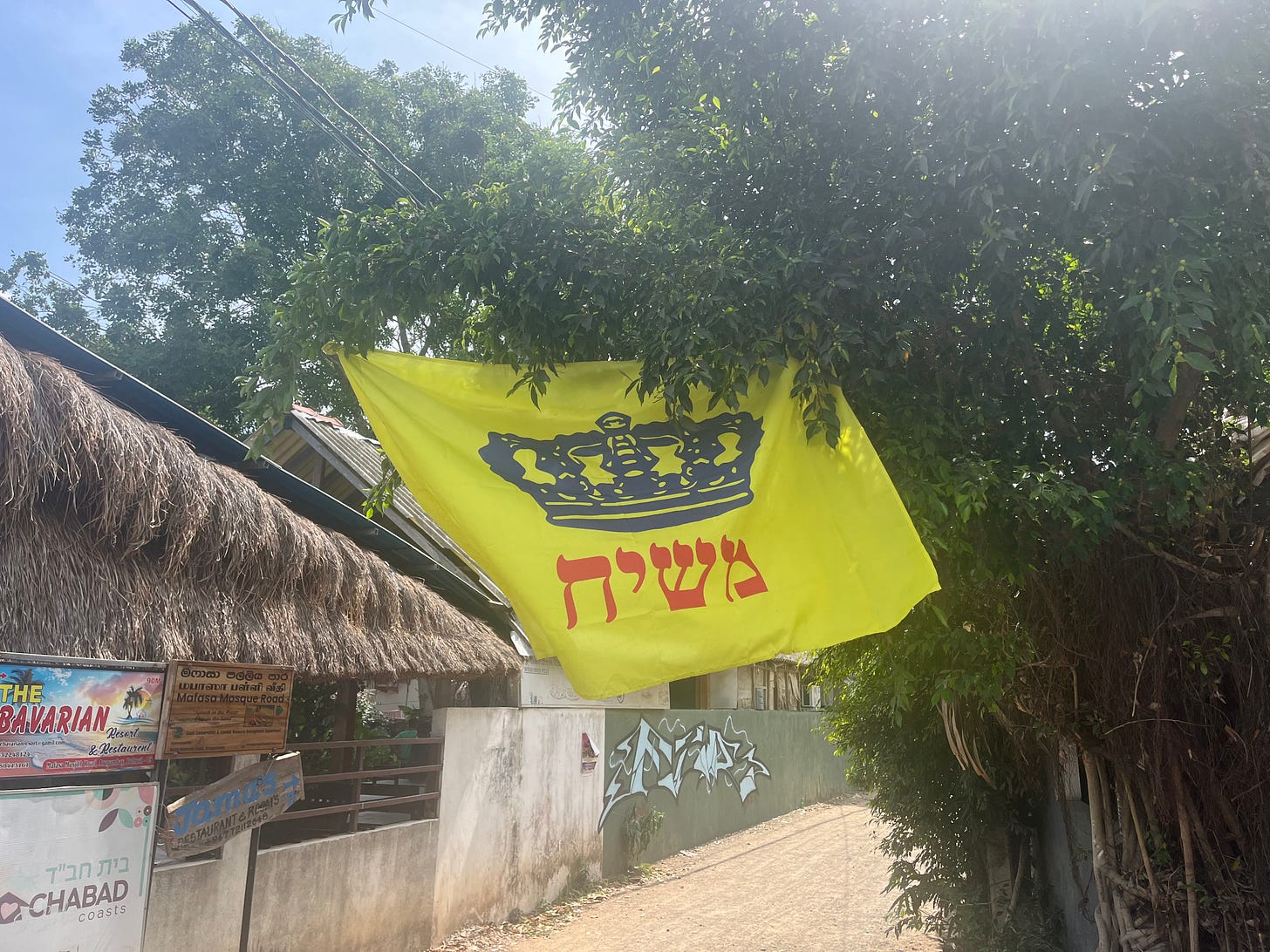
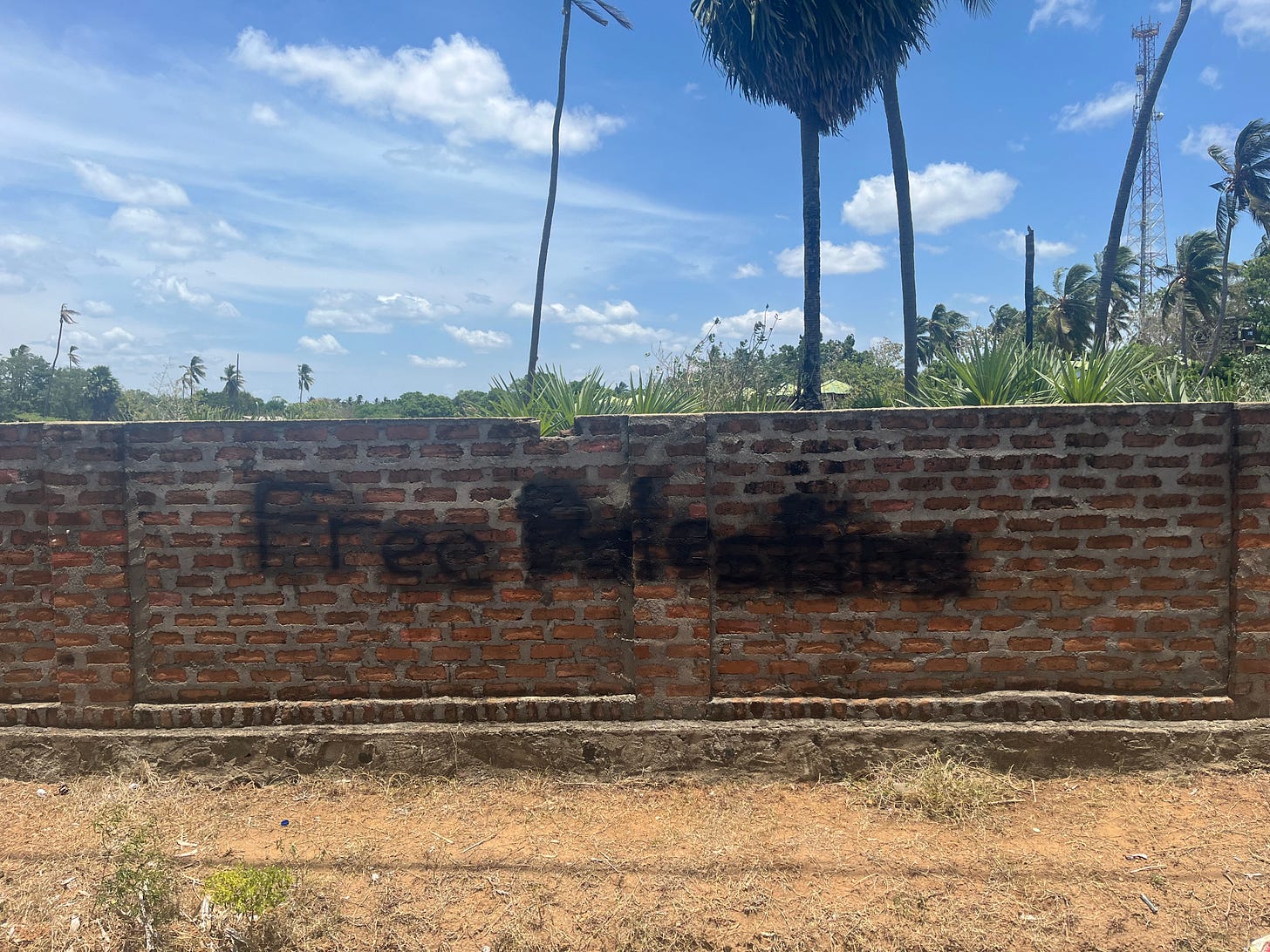
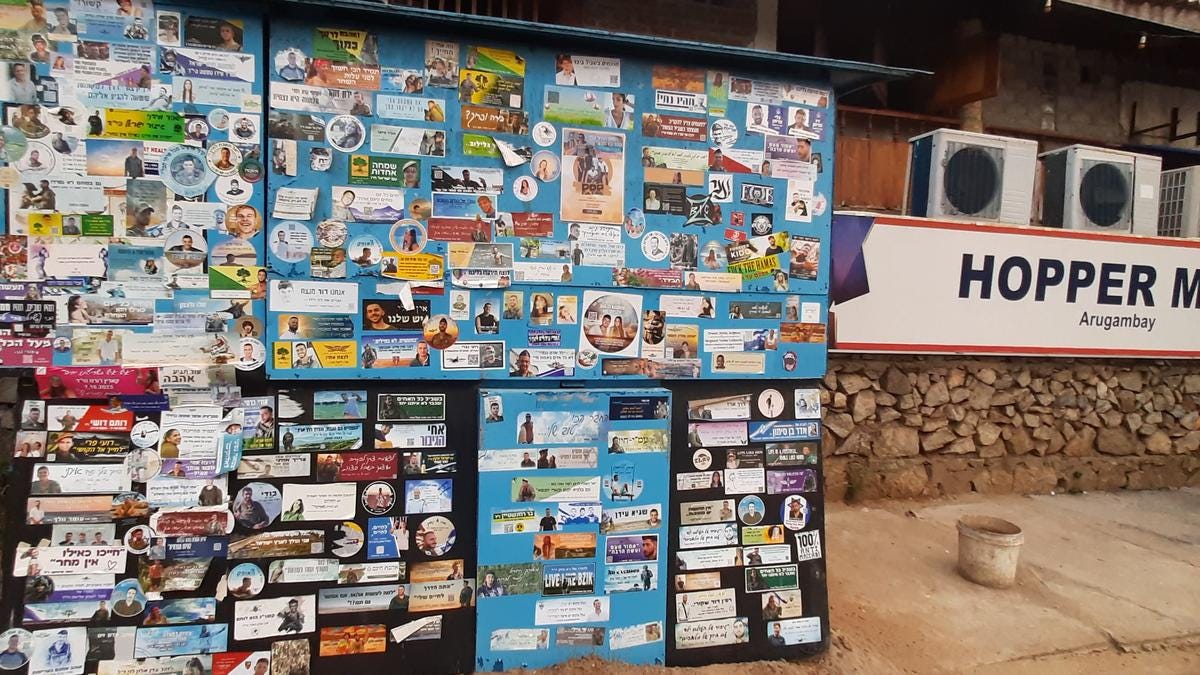
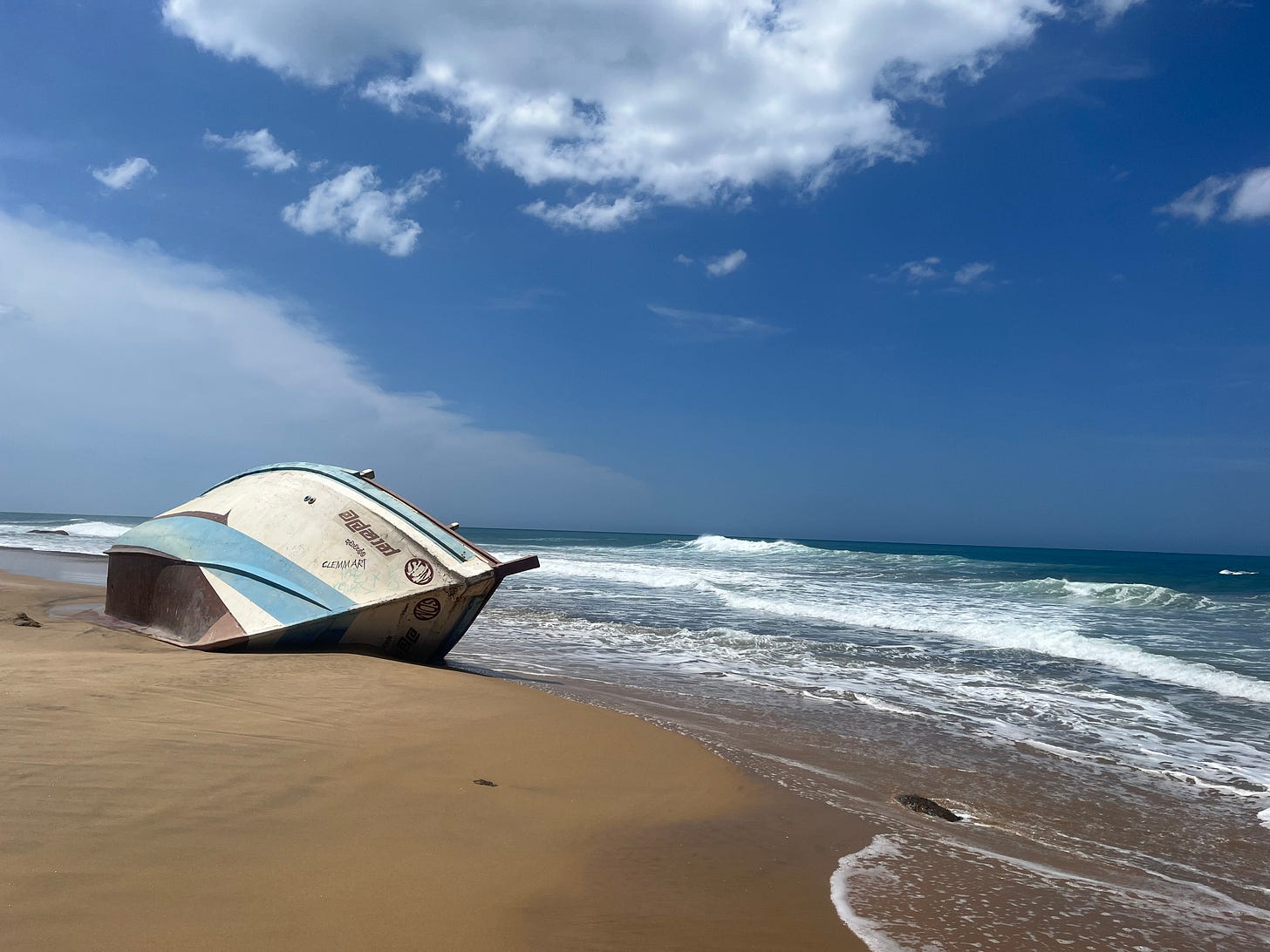
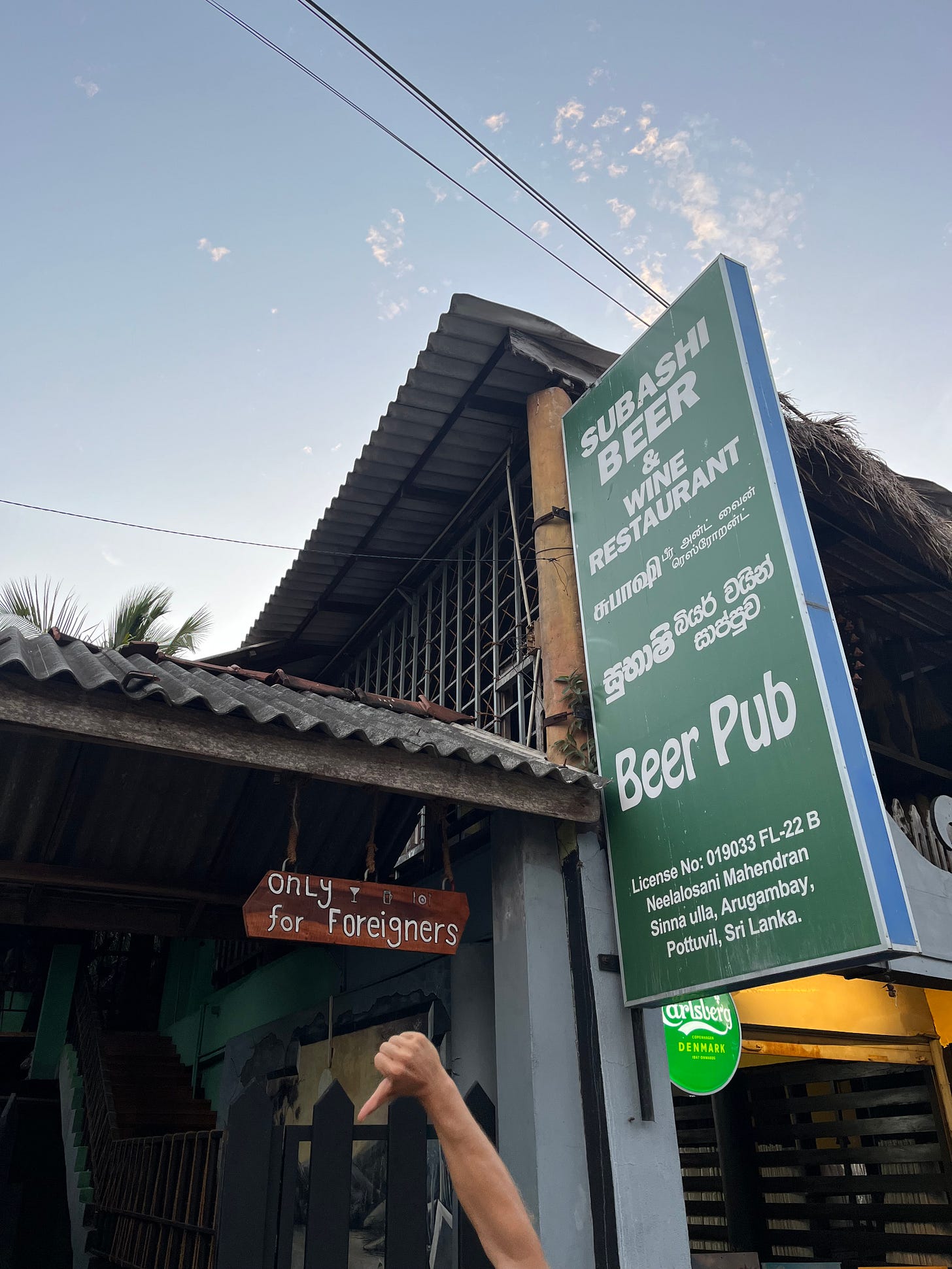
Again Jared, excellent work! Your village is a microcosm of the larger world that envelops it - something that your present piece captures in an honest and engaging manner!
Those travel bans - from 3 of the most imperialist nations on earth historically and today - tell so much about white vs. brown sensibilities, culture, power and politics. Again, you threaded your way through those openly and honestly… I know which side I am on… and I now have a better understanding of what is happening in your neck of the world
Great reporting
Larry and Michael in Memphis
Thank you for sharing your insights. Interesting dilemma.